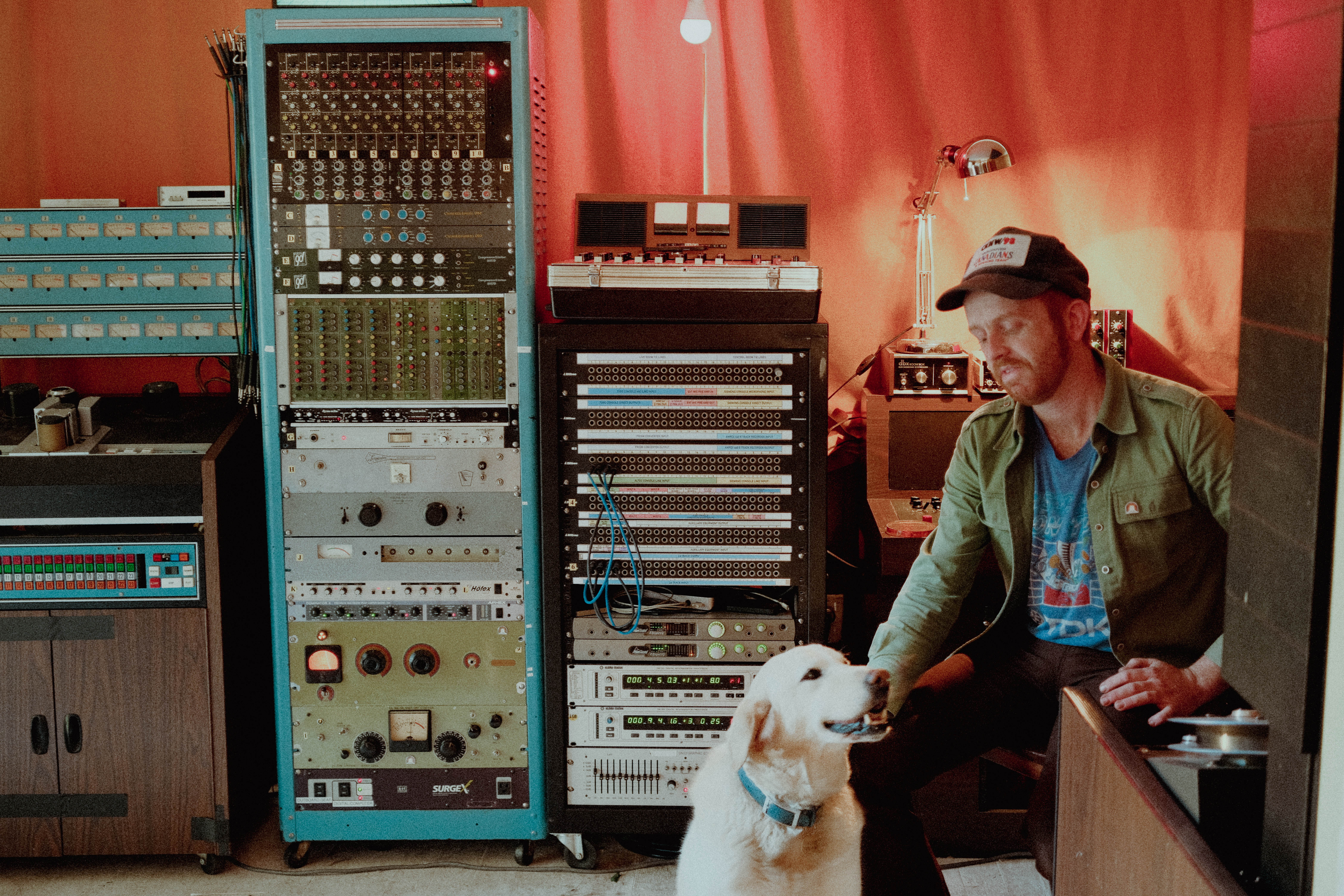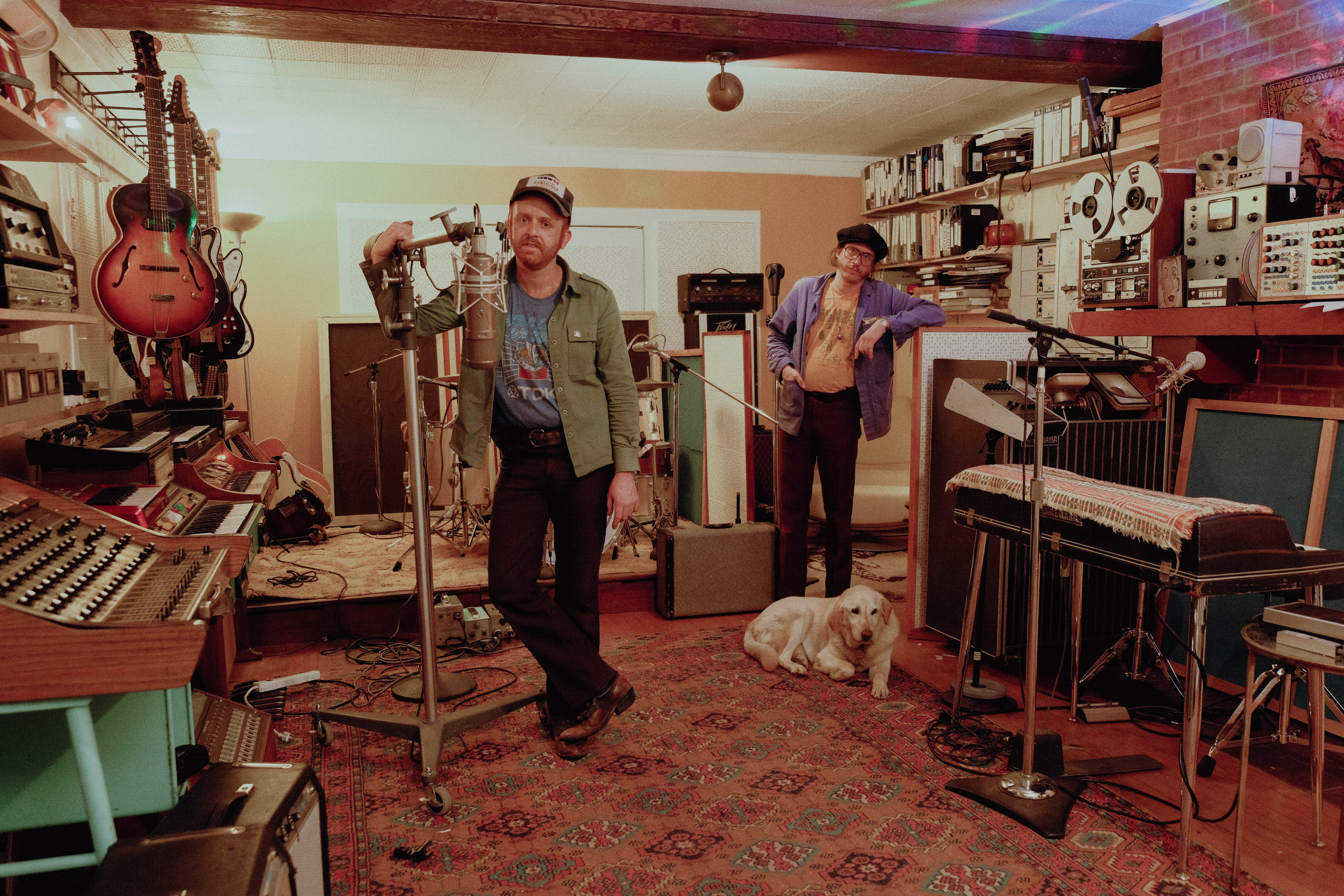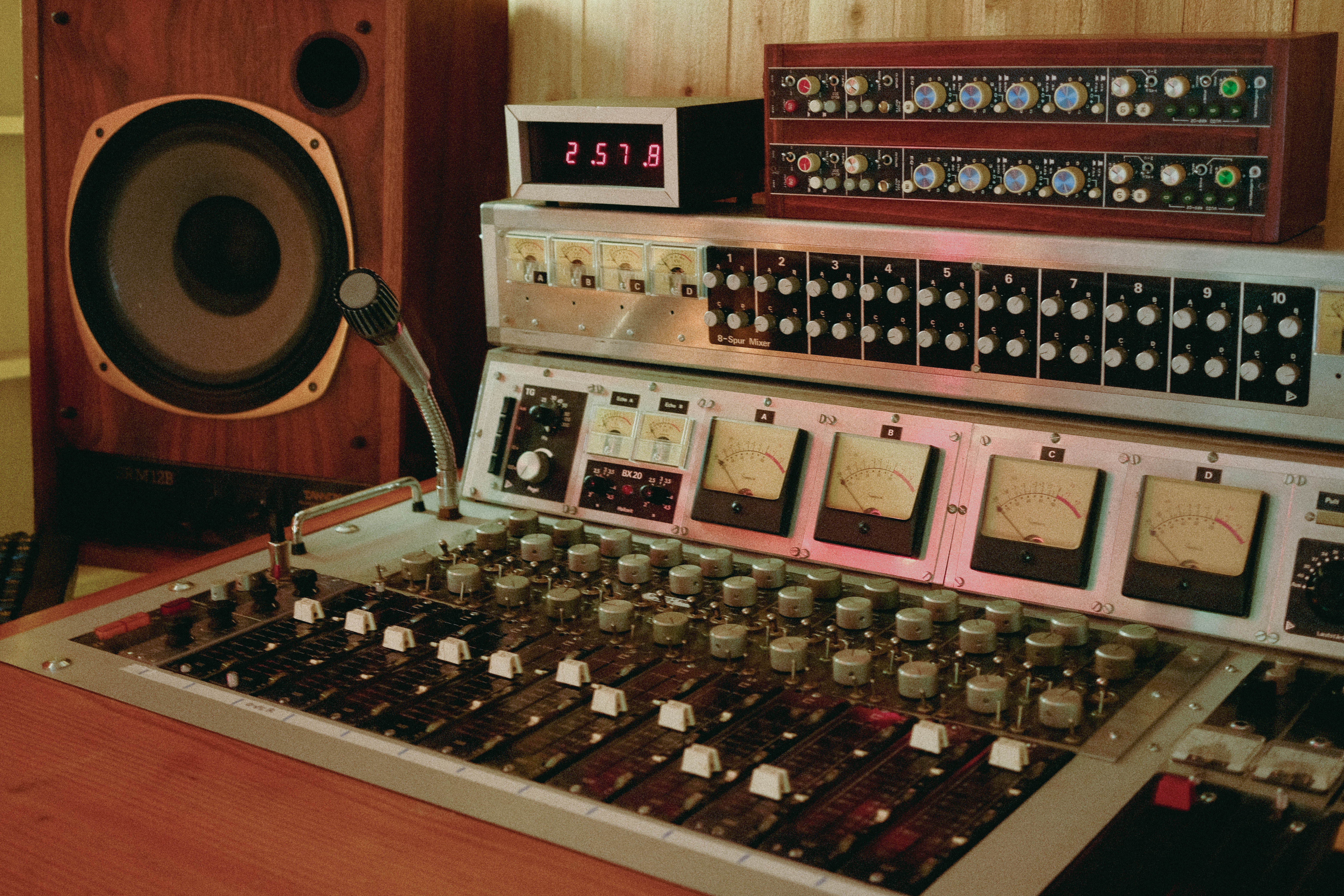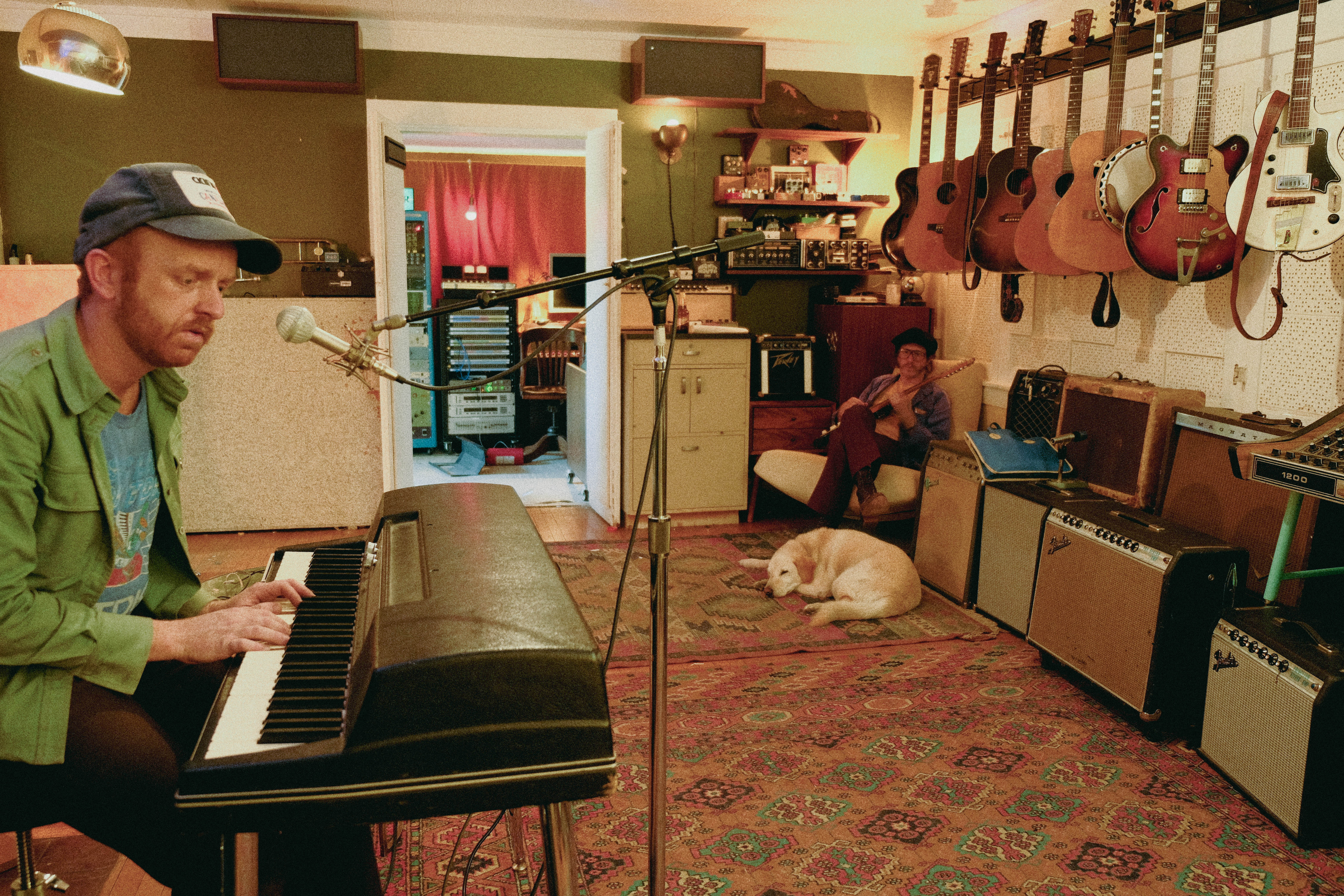
The psychological aspect of recording is often swept under the rug. We can easily picture engineers setting up mics and adjusting levels, but can’t always envision the emotional labor involved in each project. This invisible work is essential for building rapport with musicians and getting the most from their performances. For Los Angeles based recordist and musician Ian Doerr, having the right gear pales in comparison to maintaining magic in the room.
As owner of Love Magnet, his gear repair shop turned analog studio in Highland Park, Doerr balances his deep love for the technical, scientific side of recording with a ‘people-first’ mentality. Alongside a team of music obsessives, Love Magnet is a rare breed for tape-based studios in that much of their gear has been custom built or reassembled by Doerr himself. With over a decade’s worth of studio experience, he remains led by curiosity and is neither precious nor secretive by what he does and how he does it.
We caught up with Doerr at home to hear more about his philosophy and approach to recording, working on new music with Tim Heidecker and Lana Del Rey, and narrowing the technical and artistic divide.

Give me some background on your space.
We've had this space for two years. My girlfriend and I started looking for a house, and found this spot in Highland Park, a duplex. We were living on the top floor and my landlord had the bottom floor for her business. Slowly but surely, I started taking over the whole house. Mostly repair work, which is something I took on during the pandemic. It’s always been something I've done. It’s part of the gig with analog recordings.
When we couldn't hang out in studios, I focused more on that work. It took off in a way I wasn't expecting. I got busy taking care of everyone’s robots. We've always had a studio and a tech area. Recently the studio side has been winning the fight and the tech side is slowly getting pushed out.
Were there key events or discussions that led to that shift?
Bit of both. There is joy in the technical work. I like to be helpful, bring things back to life. It's beautiful in its own way, but comes with its own responsibility, which I didn't intend on taking on. A lot of anxieties that aren't even your own.
Can you give an example?
I am one thousand percent down for the 388 or four-track cassette kiddos. Before, it all had a very DIY aesthetic. The people that were into them were getting in there, changing their belts, making repairs. Knowing how it worked was part of it. Now I've noticed, and this is not everybody, but people buy these machines under the assumption that it will open a door that was closed to them previously. I’m the one that’s supposed to help them open it. It’s just a tape machine, you know? It’s going to break next week no matter what, even if it’s mine. You have to know how to fix this stuff if you want to work with it. It’s a reality.
Business was good, but the clientele changed?
The work was endless. I'm sensitive to absorbing other people's stresses. I’ve had amazing clients too. At the end of the day, we all want to make music. That's what we're here for, to make records.
Were you always led by that curiosity?
Totally. I've always taken things apart and fixed them. I was exposed to great sounding recording equipment when I was around 18 years old. I had no money. I thought, "This microphone: what's inside this?" It's just a circuit. I would figure out what's inside and realize there's no magic componentry. It's just a chain of components that are put together. I would buy a tape machine for cheap and it’d be broken. If I wanted to use it, I’d have to fix it.
These were sounds that I've been chasing ever since. The finances of it make it so you can't afford these things. Especially now. How do you get there without having to buy the thing? Even if you have it, you need to maintain it. You have to know how to do the electronics unless you have somebody that does it all for you. Which I don’t.
Do you have formal education in recording?
I went to Middle Tennessee State University outside of Nashville, which has a great recording program. I volunteered in their tech shop. Spent a lot of time reading books, being on the Tape Op message forums. I learned all of this on the forum. Taking Adderall, going to the library, reading books. That's how I learned. During that time I was completely obsessed with recording to the point where I was studying outside of my coursework. I still am. I try to never stop learning. Knowing how something works is powerful.
Where do you see your skill sets overlap?
If I built this microphone, it goes into a console that I fixed or into a patch bay that I wired up and the tape machine that I take care of. I know what's going on electrically within each. I can understand why something is incorrect quickly. I know the signal chain. It's a balance of controlling what's going on electrically. If there's less mystery within that realm while you're doing creative work, it becomes its own creative thing.

That knowledge has its own magic.
There's electric magic, which is 10% of it. 90% is the song, the people, what’s happening in the room, but there's a certain amount in the wiring and the electrical realm that can be magic too.
I’d imagine it helps with communication and saves time.
I'm still confused all the time. I’m learning every day. I’ve seen people embrace the mystery, find things by accident. I could never do that. My brain doesn’t work that way. I know the difference between impedances. It all plays a certain role and can enhance what’s happening in that room.
Does being able to explain those concepts help build rapport?
That's a huge part of it. It's important for the technology not to be isolating to the artist. There's a big divide between the technical and the artistic front. I love for people to ask questions. I'll always pause and explain what's going on. It's fun, and you'll think about it differently. How to sing on that microphone. It's always great when people show any bit of interest when we're recording. We're all on the same team. It should be like that. I don't try to keep secrets from anybody.
Who else is on your team?
It's me, Kevin Lareau, and Connor ‘Catfish’ Gallaher for the most part. I've been bringing Kevin on as an assistant engineer when I have a session that can justify it. He’s so good at helping things move forward. So pragmatic. He doesn’t give a shit about any of the equipment which I find to be amazing. He’s all about making sure everyone feels okay. He has great ideas and is such a good person to be around. Connor is the most talented musician I've ever met. He helps in every way he can. He's helped me with the technical stuff when he’s not doing session work or on tour. He plays on everything we do. I try to keep it all going the best I can.
How do you approach pre-production?
It depends. There’s a certain level of musicianship that I've been lucky enough to experience, where you don't have to talk about it much. No one's asking for the chords. If you have a room full of people that can play, that are used to playing together, you’ve got a general vibe. The song might be a mystery, but everyone is there for the song. We’re almost always recording live. There are eight tracks, that's our vibe. The band's learning and figuring it out, the technical side is coming together, then there’s the top of the mountain when you press the record button and get it and it's perfect. That doesn't work for every song, but it’s ideal. It's the freshest a song will ever be without overthinking it.
You’re chasing a ‘band in a room’ sound.
That's what we do. It’s what we're best at. We’ll do overdubs and get weird, but our main thing is capturing real human magic. There’s a bit of electric magic, but that matters so little if you do the rest of it right. We can go deep on electronics, equalizers, and preamps, but once you reach a third level of fidelity it doesn't matter. I've built this whole studio to work like a 388. It’s just a more hi-fi palette.
Do you use stations – acoustic guitar zone, bass zone, and so on?
I love that, but I never leave them permanently. I'm against it. I understand the inclination, especially if you're a songwriter. I was just helping my buddy Jonathan Rado at his studio, recording his solo record. He has zones set up and it changes constantly. That's a completely valid way to work. I like to set up zones and tear them all down. I don't want to get too comfortable. It has to change occasionally, or all the time. It’s one thing that drives everyone else kind of nuts.
Is one of you the ‘lead’ engineer / what roles do you occupy?
It's not that formalized. Whoever's got an idea says it. We're all producing together. It gets tricky sometimes. We just did this Lana Del Rey song and I produced it, but so did five other people. I try not to care. Whatever makes a song better. I never get upset over someone having an idea, even if you're the tambourine player. Worst case, it's a bad idea. We'll acknowledge that it's not working and move on.
What are ways you use gear to solve problems or add color and texture to a recording?
One thing I love to do is not use headphones. I do this with some singer-songwriter friends. I’ll feed the vocal or acoustic guitar mic through a PA with spring reverb on it. They’ll only hear the reverb of their voice from far away. When they dig into it, the room reacts to them. It’s not complete isolation. When people are doing something as intimate as vocals, headphones can freak them out. Putting a glorified version of themselves in the monitoring doesn’t make the recording weird. It makes the room sound bigger than it is with nice tube mics. They pick up the reverb in the room. It helps make the recording a bit more interesting. Picking up the reverb in the room through fancy mics instead of blending it in underneath.
Recording vocals can be so intimidating.
It’s a big thing. I sing too, so I know how it is. I have to hold the guitar when I sing. I’m down to do whatever mental gymnastics necessary to make people feel okay. None of it is too ridiculous or silly. Lay on the ground, do whatever you need to do.
What are vocal mics you’ve been using recently?
We have a mic that we make. It’s our own version of a U48 style microphone. It has this beautiful figure eight polar pattern, which I use all the time. It picks up nothing on the sides which comes in handy when we are doing a live recording but still want that big vocal sound. We make them, so it’s a bit less stressful. Pairing the person through a mic is a real thing. You have to throw a bunch of mics up and see what works. I don’t like to touch vocals at all. I don’t EQ them, you shouldn’t have to do much. You do need to take the time to find the right mic for each person.

What are your most essential pieces of gear?
My AKG BX20 Spring reverb. I'm not a huge reverb person, but I use it all the time. I have a Siemens sidecar I use on everything and my speakers I love. Tannoy Mastering Lab takeaway speakers. I can’t imagine not having those. If you change your speakers, you’re kind of starting over. It’s like getting a new prescription for your glasses. You have to really know them. They don’t have to be great speakers. We try to plug nice mics into nice things. Everything else changes constantly. There’s nothing we have that’s cheating. There’s no secret. We have an Ampex 8 track, the 440-8. It’s always worked well for us.
Anything that holds sentimental value?
Not particularly. Equipment is weird. I try not to give too much credit to the machinery. People think I care about gear a whole lot more than I do. I just know about it. It’s like baseball statistics.
Would that be the advice you’d give to someone getting started? Know your gear?
Know how it works. I hate to see people not start because they're waiting on some piece of the puzzle. Use what you have. Studios are never done. The second you realize that, you're on your way. A microphone or a preamp has never stopped a record from being great or not. If you have nice things, use them. If you don't, just record. It shouldn't matter.
I wonder what creates that feeling.
There's too much obsession with the object. I've seen it more and more. Especially during bleak pandemic times. People have gotten overly obsessed with equipment. We’ve seen the market go bananas.
With vintage gear it's surreal. If you find something you think is useful or cool, that's valid. I like shitty, stupid things too. I don't need a Fairchild. Sometimes when I go to fancy studios, I love to have the Fairchild in the rack and not use it. I don't need it. Why would I need this compressor? There's something liberating about not relying on it.
The only thing that’s important is if something is inspiring to you. Instruments are way more inspiring than recording equipment. Recording equipment is utilitarian to be honest. It doesn't do anything unless you're recording. Some of it's more fun than others. With guitars and keyboards, there are some I could never get rid of. You never know when you’ll need this weird sound.
What are current projects you’re excited about?
We're in the middle of Tim Heidecker’s record. About to start mixing. That record is probably the most fun I've ever had recording.The best band and we did it all so fast. It was so joyous. I'm very excited about that one. Everyone trusted each other, it felt effortless. It doesn't always go like that.
That's something you feed off of - when people you are bringing together are vibrating. It's the most important thing. If you have one person that's not supposed to be there it can change the whole feel. People are the most important thing when you're trying to record… people.
We've been working on a project together called Low Sky. We're about to release our first pair of singles. I’m excited to get them out in the world. It's going to be huge for me. I've been putting it off for so long. It's time to stop doing that. We just worked with Lana Del Rey, which was fun. That came out of nowhere.
I’ve also been recording with Jon Batiste over at East West with Nick Waterhouse. I’m engineering. He’s unbelievable. The most inspired, talented person. Complete musical phenom, just blows my mind. Filled with joy, a special human. We go into this nice studio with no plan whatsoever. It feels reckless. We're at one of the nicest studios in the world, with no idea what's going on and leave with eight songs. It’s based on inspiration and feeling a certain way in the moment.
Also excited about my solo project called Beach Toys. I’ll probably put out a song in the next week or two.
